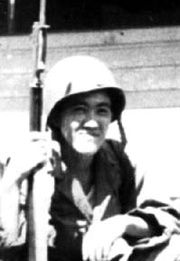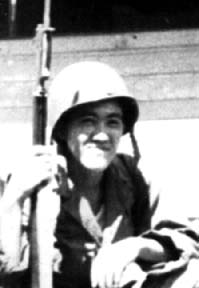
Base de Datos de Experiencias Militares de Japoneses Americanos

Henry S. "Hank" Yoshitake
Frontal attack on Gothic Line
Breakthrough into Po Valley.
Presidential Unit Citation, Gothic Line breakthrough.
Personal:
Combat Infantryman's Badge
European African Middle Eastern Medal with 3 battle stars
Bronze Star Medal
World War II Victory Medal
Army of Occupation Medal
Good Conduct Medal
Expert Rifleman's Medal
Took turns sleeping in foxholes.
Whenever water was nearby, we took off our clothes and drenched ourselves.
We ate dry C and K Rations.
We had no time for entertainment.
Rest Area about every two weeks:
We slept in tents or in hotel rooms.
We took mass shower and received change of clothes.
We ate in chow lines.
We had USO shows and visited nearby towns.
The western portion of the German Gothic Line had withstood attacks for 4 or 5 months and had to be penetrated in order for Allied forces to continue its drive up the Italian peninsula. This section was protected by mine fields, concrete bunkers and cannons from deep inland. The steep and narrow mountainous terrain allowed the defenders the advantage to inflict heavy casualties.
Company A, 100th Battalion was assigned the task of making a frontal attack with the 2nd platoon in the mine field over the bunkers and the 3rd platoon attacking from the left flank. The right flank was a sheer vertical drop to the valley below.
After a ten minutes barrage, Co. A attacked and as expected, met heavy resistance. Eight men stepped on mines. Hand grenades, mortar shells, machine gun and rifle fire took a heavy toll. My job as a part of the machine gun squad was to supply fire power to the 2nd platoon and to prevent the escape or replacements from coming to the aid of the defenders. The fighting was fierce as each hand grenade thrown was answered by five or six from the bunkers. With the attack from above and from the left, many of the Jerries were killed or severely wounded. A short pause allowed the medics from both sides to evacuate the wounded before the shooting started again. Before the day was over, the 100th Battalion had gained the crest of the first series of hills that had resisted other units for months.
The 100th/442nd RCT received a Presidential Unit Citation for this day's action and Company A, 2nd platoon squad leader Sadao Munemori received the Congressional Medal of Honor for heroism. (Was killed-in-action, protecting his friends from an exploding German grenade that had landed near-by.)


